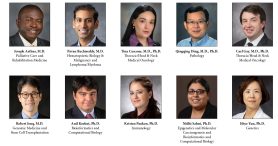- Diseases
- Acoustic Neuroma (14)
- Adrenal Gland Tumor (24)
- Anal Cancer (68)
- Anemia (2)
- Appendix Cancer (16)
- Bile Duct Cancer (26)
- Bladder Cancer (72)
- Brain Metastases (28)
- Brain Tumor (232)
- Breast Cancer (714)
- Breast Implant-Associated Anaplastic Large Cell Lymphoma (2)
- Cancer of Unknown Primary (4)
- Carcinoid Tumor (8)
- Cervical Cancer (158)
- Colon Cancer (166)
- Colorectal Cancer (116)
- Endocrine Tumor (4)
- Esophageal Cancer (44)
- Eye Cancer (36)
- Fallopian Tube Cancer (8)
- Germ Cell Tumor (4)
- Gestational Trophoblastic Disease (2)
- Head and Neck Cancer (12)
- Kidney Cancer (128)
- Leukemia (342)
- Liver Cancer (50)
- Lung Cancer (286)
- Lymphoma (278)
- Mesothelioma (14)
- Metastasis (30)
- Multiple Myeloma (100)
- Myelodysplastic Syndrome (60)
- Myeloproliferative Neoplasm (4)
- Neuroendocrine Tumors (16)
- Oral Cancer (100)
- Ovarian Cancer (172)
- Pancreatic Cancer (160)
- Parathyroid Disease (2)
- Penile Cancer (14)
- Pituitary Tumor (6)
- Prostate Cancer (146)
- Rectal Cancer (58)
- Renal Medullary Carcinoma (6)
- Salivary Gland Cancer (14)
- Sarcoma (238)
- Skin Cancer (296)
- Skull Base Tumors (56)
- Spinal Tumor (12)
- Stomach Cancer (64)
- Testicular Cancer (28)
- Throat Cancer (92)
- Thymoma (6)
- Thyroid Cancer (96)
- Tonsil Cancer (30)
- Uterine Cancer (80)
- Vaginal Cancer (16)
- Vulvar Cancer (20)
- Cancer Topic
- Adolescent and Young Adult Cancer Issues (20)
- Advance Care Planning (10)
- Biostatistics (2)
- Blood Donation (18)
- Bone Health (8)
- COVID-19 (362)
- Cancer Recurrence (120)
- Childhood Cancer Issues (120)
- Clinical Trials (630)
- Complementary Integrative Medicine (22)
- Cytogenetics (2)
- DNA Methylation (4)
- Diagnosis (232)
- Epigenetics (6)
- Fertility (62)
- Follow-up Guidelines (2)
- Health Disparities (14)
- Hereditary Cancer Syndromes (126)
- Immunology (18)
- Li-Fraumeni Syndrome (8)
- Mental Health (116)
- Molecular Diagnostics (8)
- Pain Management (62)
- Palliative Care (8)
- Pathology (10)
- Physical Therapy (18)
- Pregnancy (18)
- Prevention (914)
- Research (392)
- Second Opinion (74)
- Sexuality (16)
- Side Effects (604)
- Sleep Disorders (10)
- Stem Cell Transplantation Cellular Therapy (216)
- Support (402)
- Survivorship (320)
- Symptoms (182)
- Treatment (1786)
MD Anderson announces 2023 class of Andrew Sabin Family Fellows
2 minute read | Published July 21, 2023
Medically Reviewed | Last reviewed by an MD Anderson Cancer Center medical professional on July 21, 2023
Up-and-coming clinicians and scientists represent some of the best and brightest in field
HOUSTON ― The University of Texas MD Anderson Cancer Center has named 10 early career faculty members to the 2023 class of Andrew Sabin Family Fellows. Established by philanthropist Andrew Sabin through a generous $30 million endowment in 2015, the Sabin Family Fellowship program nurtures brilliant rising clinicians and scientists to deliver cancer breakthroughs.
Each Sabin Family Fellow will receive $100,000 over two years. This funding frees researchers to pursue novel or high-risk, high-reward scientific endeavors early in their careers when federal and private funding opportunities often are limited.
“The Sabin Family Fellows embody the bold hope we have for the future of cancer research,” said Sabin, a senior member of the
MD Anderson Cancer Center Board of Visitors. “Their innovative ideas, relentless pursuit of knowledge and tireless commitment to patient care is inspiring. I believe their work will improve cancer prevention, care and outcomes for cancer patients everywhere.”
Finalists were selected through a rigorous external peer review process. A panel of 37 internationally renowned experts — chaired by Padmanee Sharma, M.D., Ph.D., director of scientific programs at MD Anderson’s James P. Allison Institute, as appointed by Giulio Draetta, M.D., Ph.D., senior vice president and chief scientific officer — participated in the review of the applications. The 2023 class of Sabin Family includes:
Basic/Translational Scientists
Kristen Pauken, Ph.D., assistant professor, Immunology
Jihye Yun, Ph.D., assistant professor, Genetics
Clinical Researchers
Joseph Arthur, M.D., associate professor, Palliative Care and Rehabilitation Medicine
Qingqing Ding, M.D., Ph.D., associate professor, Pathology
Carl Gay, M.D., Ph.D., assistant professor, Thoracic/Head & Neck Medical Oncology
Physician-Scientists
Robert Jenq, M.D., deputy department chair and associate professor, Genomic Medicine, and associate professor, Stem Cell Transplantation
Pavan Bachireddy, M.D., assistant professor, Hematopoietic Biology & Malignancy and Lymphoma & Myeloma, and scientific director, Evolution of Cancer, Leukemia and Immunity Post Stem Cell Transplant (ECLIPSE)
Tina Cascone, M.D., Ph.D., assistant professor, Thoracic/Head & Neck Medical Oncology
Population/Quantitative Scientists
Anil Korkut, Ph.D., assistant professor, Bioinformatics and Computational Biology and regular member, Quantitative Sciences
Nidhi Sahni, Ph.D., associate professor, Epigenetics and Molecular Carcinogenesis and regular member, Bioinformatics and Computational Biology
Since the fellowship was established, 72 Sabin Family Fellows have been named for their distinction and innovation in their respective fields. The work of the Sabin Family Fellows spans the cancer care continuum, from basic science to translational research to survivorship, and is already impacting the lives of patients at MD Anderson.
“We greatly appreciate the Andrew Sabin Family Foundation’s continued support for MD Anderson’s mission to end cancer,” said President Peter WT Pisters, M.D. “By investing in our young talent and their novel ideas, this generous partnership accelerates crucial cancer breakthroughs and advances practice-changing care for cancer patients around the world. Together, we are Making Cancer History®.”

By investing in our young talent and their novel ideas, this generous partnership accelerates crucial cancer breakthroughs and advances practice-changing care for cancer patients across the world.
Peter WT Pisters, M.D.
President of MD Anderson
